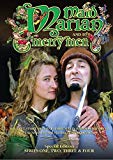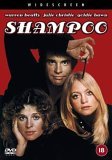 Kids DVD Collection. Row row row your boat, The Wheels on the Bus, Twinkle Twinkle Little Star & Never smile at a crocodile | DVD | (24/07/2017)
from £6.99
| Saving you £N/A (N/A%)
| RRP
Kids DVD Collection. Row row row your boat, The Wheels on the Bus, Twinkle Twinkle Little Star & Never smile at a crocodile | DVD | (24/07/2017)
from £6.99
| Saving you £N/A (N/A%)
| RRP ![Blackadder: The Complete Collection [Blu-ray]](/pictures/1164113.jpg) Blackadder: The Complete Collection | Blu Ray | (04/12/2023)
from £58.25
| Saving you £N/A (N/A%)
| RRP
Blackadder: The Complete Collection | Blu Ray | (04/12/2023)
from £58.25
| Saving you £N/A (N/A%)
| RRP Blackadder: The Complete Collection is a triumph of stupidity over common sense! Featuring every episode that Baldrick could find (apart from the pilot, which he traded for a Turnip), all four series and specials have been cured by leeches and are presented in high definition for first time. Furthermore, throughout the ages men of flair, facility and outstanding courage have emerged from the dust of dodgy documents and film from the cutting room floor to create the most cunning of special features. Whilst Baldrick, of course, the man you can rely on has managed to gather rooms full of deeply horrid people to create a huge pie of new and exclusive entertainment. Product Features Brand New Audio Commentaries: The Archbishop ~ Brian Blessed The Foretelling ~ John Lloyd Beer ~ Miranda Richardson Dish and Dishonesty ~ Mandie Fletcher Captain Cook ~ Richard Boden Corporal Punishment ~ Chris Wadsworth Studio recordings of: Potato Duel & Duality Corporal Punishment Cavalier Years Goodbyeee
![Blackadder Remastered - The Ultimate Edition [DVD] [1982]](/pictures/1092976.jpg) Blackadder Remastered - The Ultimate Edition | DVD | (15/06/2009)
from £16.49
| Saving you £-3.02 (N/A%)
| RRP
Blackadder Remastered - The Ultimate Edition | DVD | (15/06/2009)
from £16.49
| Saving you £-3.02 (N/A%)
| RRP Like a skidmark through history the Edmund Blackadders left an indelible dirty stain on every era they passed through. No one knows where the notorious Blackadder family originated from - some say the shallow end of the gene pool others just nod and point to the cess-pit behind the pig-sheds. Every new era produces a more contemptuous Edmund Blackadder each incarnation bearing a striking resemblance to the last carrying forward the family traditions of cowardice treachery and political corruption. Accompanying each generation of Edmund Blackadders is the 'Baldrick' family a loyal breed of human pack-animal and the byword for all things stupid.
 Blackadder - Complete Blackadder | DVD | (03/10/2005)
from £49.99
| Saving you £10.00 (20.00%)
| RRP
Blackadder - Complete Blackadder | DVD | (03/10/2005)
from £49.99
| Saving you £10.00 (20.00%)
| RRP Like a skidmark through history the Edmund Blackadders left an indelible dirty stain on every era they passed through. No one knows where the notorious Blackadder family originated from - some say the shallow end of the gene pool others just nod and point to the cess-pit behind the pig-sheds. Every new era produces a more contemptuous Edmund Blackadder each incarnation bearing a striking resemblance to the last carrying forward the family traditions of cowardice treachery and po
![Time Team: Series 17 [DVD]](/pictures/1131970.jpg) Time Team: Series 17 | DVD | (01/09/2014)
from £12.03
| Saving you £12.96 (107.73%)
| RRP
Time Team: Series 17 | DVD | (01/09/2014)
from £12.03
| Saving you £12.96 (107.73%)
| RRP All episodes from the 17th series of the Channel Four archaeology programme presented by Tony Robinson, exploring the history of Britain through digs and the artefacts uncovered. The episodes are: 'Corridors of Power', 'A Saintly Site', 'Bridge Over the River Tees', 'In the Halls of a Saxon King', 'The Massacre in the Cellar', 'Potted History', 'Death and Dominoes: The First POW Camp', 'Something for the Weekend', 'Governor's Green', 'Priory Engagement', 'There's a Villa Here Somewhere', 'Commanding Heights' and 'Rooting for the Romans'.
 Maid Marian and her Merry Men - The Complete BBC TV Series 1-4 Limited Edition (DVD) | DVD | (21/11/2016)
from £N/A
| Saving you £N/A (N/A%)
| RRP
Maid Marian and her Merry Men - The Complete BBC TV Series 1-4 Limited Edition (DVD) | DVD | (21/11/2016)
from £N/A
| Saving you £N/A (N/A%)
| RRP Eureka Entertainment to re-release MAID MARIAN AND HER MERRY MEN, the must-see comedy drama starring Tony Robinson (Blackadder, Time Team) and Danny John-Jules (Red Dwarf), in a limited edition (3000 copies) DVD boxset on 21 November 2016. MAID MARIAN AND HER MERRY MEN was consistently number 1 in the children's TV ratings throughout its four series, partly because it was popular with children of all ages, but also because it became 'must see' viewing for students and young adults. It was popular with the critics too, winning a BAFTA, an RTS Award and the International Prix Jeunesse. This perfectly conceived historical farce is witty, warm and stylish. An excellent cast and faultless writing has drawn comparisons to Blackadder, Red Dwarf, and The Young Ones. It is one of those rare programmes made for and enjoyed by both children and adults and has secured a huge fan-base in the twenty-seven years since the first series was initially transmitted. Written by and starring Tony Robinson as the Sherriff of Nottingham, Tony has been a regular on our TV screens since he got his big break playing Baldrick in Blackadder. Contained in slim-line packaging with outer slipcase, all four series of Maid Marian and her Merry Men are featured alongside a compendium booklet by the artist Paul Cemmic (who did the graphics for the original series) released on DVD by Eureka Entertainment on 21 November 2016.
![Candyman - Day Of The Dead [2000]](/pictures/1022501.jpg) Candyman - Day Of The Dead | DVD | (24/02/2003)
from £12.89
| Saving you £1.10 (8.53%)
| RRP
Candyman - Day Of The Dead | DVD | (24/02/2003)
from £12.89
| Saving you £1.10 (8.53%)
| RRP Remember Candyman, Bernard Rose's fine 1993 urban-legend horror movie based on Clive Barker's screenplay? How about Candyman: Farewell to the Flesh, the inevitable but actually halfway decent second bite at the cherry? Well, in the time-honoured tradition of sequels having less to do with the original with every step down the filmic food chain, the third instalment in the saga of the hook-handed bogeyman had no input from Barker, contains no creepy Phillip Glass score and has no real connection to either of its predecessors in terms of plot. That is unless you count the goon of the title (Tony Todd), returning from whatever ethereal plane he usually resides in to put the wind up his--wait for it--great, great grandaughter, slack-jawed LA art gallery owner Caroline McKeever (Donna D'Errico, hitherto best known for her work on Baywatch). Desperate to claim her soul so he can have a spot of companionship throughout the long days of eternity, Todd promptly sets about slicing and dicing various unfortunate Angelenos, making sure his last living relative gets the blame each and every time. Headed straight for the chair, can D'Errico save LA, and herself, from her heinous ancestor? And, more to the point, can she do so while walking and chewing gum at the same time? Dependent on huge amounts of viscera and its female lead's willingness to shed her clothes, this cheap knock-off still conjures the up the odd moment of unsettling gloom, while Todd is as reliably hammy as ever. All the same, you can't help hoping this is definitely, positively the last time round the block for the franchise: whatever you do, don't stand in front of any mirrors chanting "Candyman 4, Candyman 4, Candyman 4". The results will be horrific. --Danny Leigh
 Blackadder: Complete Series 2 (Blackadder II) | DVD | (13/11/2000)
from £26.98
| Saving you £-6.99 (N/A%)
| RRP
Blackadder: Complete Series 2 (Blackadder II) | DVD | (13/11/2000)
from £26.98
| Saving you £-6.99 (N/A%)
| RRP Although now regarded as the opening salvo of a classic series, the original Blackadder series was not considered a great success, either among critics or many viewers, so a major rethink took place when it was recommissioned. On the writing front, future-Four Weddings And A Funeral scribe Richard Curtis was joined by Ben Elton, while the expensive War of the Roses-era sets were replaced by cosier Elizabethan ones. The most important change, however, was with Rowan Atkinson's eponymous character who, in the first series, had been a fairly weak-willed idiot but now emerged as the familiar Machiavellian fiend which would cement Atkinson's place in the pantheon of great British sitcom actors. Moreover, even if so many of the script's lines have been subsequently ripped off by lesser hands that it can't help but occasionally sound dated, the central performances of Atkinson, Tony Robinson (Baldrick), Tim McInnery (Lord Percy), Stephen Fry (Lord Melchett) and, of course, Miranda Richardson as the childishly psychotic Queen Elizabeth ("I love it when you get cross. Sometimes I think about having you executed just to see the expression on your face") remain note perfect. Yet the real pleasure for viewers may be in rediscovering the raft of excellent guest star performances--not least Tom "Doctor Who" Baker's berserk turn as a literally legless old sea dog given to guzzling his own urine long before the drinking water has run out. --Clark Collis
![Time Team: Series 15 [DVD]](/pictures/1122316.jpg) Time Team: Series 15 | DVD | (02/09/2013)
from £12.99
| Saving you £12.00 (92.38%)
| RRP
Time Team: Series 15 | DVD | (02/09/2013)
from £12.99
| Saving you £12.00 (92.38%)
| RRP All episodes from the 15th series of the Channel Four archeology programme presented by Tony Robinson which explores the history of Britain through digs and the artifacts uncovered. The episodes are: 'Gold in the Moat', 'Street of the Dead', 'Bodies in the Dunes', 'The Naughty Nuns of Northampton', 'Mysteries of the Mosaic', 'Blitzkrieg On Shooter's Hill', 'Keeping Up With the Georgians', 'Saxons On the Edge', 'Fort of the Earls', 'From Constantinople to Cornwall', 'Five Thousand Tons of Stone', 'The Romans Recycle' and 'Hunting King Harold'.
 Shampoo | DVD | (08/12/2003)
from £14.51
| Saving you £-8.52 (N/A%)
| RRP
Shampoo | DVD | (08/12/2003)
from £14.51
| Saving you £-8.52 (N/A%)
| RRP A modish creation teased into life by Warren Beatty, Shampoo was an offbeat Hollywood hit back in 1975. Made after Watergate, it reflects on the hedonism of late-60s Los Angeles with a sad, somewhat cynical eye. Basically a bedroom farce, fuelled by some famously raunchy dialogue, its comedy is nevertheless underlain with melancholy. Screenwriter Robert Towne was inspired by Wycherly's Restoration comedy The Country Wife, wherein a wily fellow convinces friends of his impotence even while he is merrily seducing their wives. Hence, Towne invented handsome Beverly Hills hairdresser George Roundy (Beatty), who ought to be gay, but emphatically isn't. Shampoo begins on US Election Day, 1968, as Nixon is trouncing McGovern at the polls, and George Roundy is trying to sort his life out. An earnest advocate of sensual pleasure, he beds most of his female clients, from the fretful Jill (Goldie Hawn) to the wealthy Felicia (Lee Grant). Yet George is himself unfulfilled, and imagines that owning his own salon will satisfy him. He asks Felicia's husband Lester (Jack Warden) to back him, but first Lester coerces George into squiring his mistress Jackie (Julie Christie) to a Nixon victory party. Inevitably, Jackie is another of George's girls and, having seduced Felicia's vivacious daughter (Carrie Fisher) earlier that day, George has much to conceal from Lester and Felicia as the evening's festivities unravel. Shampoo shows the 60s turning sour. The characters are rich hippies, superficially liberated but deeply unhappy, and blandly indifferent to the dawning of the Nixon era. The excellent Lee Grant won an Oscar, but Shampoo is Beatty's film. He produced it, had a substantive hand in Towne's script, and deputised the nominal director, Hal Ashby. The film mildly exploits legends of Beatty's real-life sexual prowess, but mainly it embodies his commitment to making thoughtful movies for grown-ups. Richard Kelly
 Blackadder: Complete Series 4 (Blackadder Goes Forth) | DVD | (22/10/2001)
from £8.99
| Saving you £11.00 (122.36%)
| RRP
Blackadder: Complete Series 4 (Blackadder Goes Forth) | DVD | (22/10/2001)
from £8.99
| Saving you £11.00 (122.36%)
| RRP The final Blackadder series, which first appeared in 1990, was the most highly evolved of all of the Richard Curtis/Ben Elton-scripted excursions. Having contrived to attain the Crown at the end of the third series, Rowan Atkinson's Edmund Blackadder is now reduced to a mere Captaincy in the trenches during World War I, with these episodes finding him shooting messenger pigeons, grumbling about Charlie Chaplin and unscrupulously evading his patriotic duty to pile over the top and be slaughtered pointlessly. Hugh Laurie plays the upper class silly arse to the hilt while Baldrick, who has grown progressively more stupid throughout the four series, can barely muster the intelligence to move from the spot. Blackadder Goes Forth stoutly refused to the end to abandon its relish for broad, puerile scatological puns: "Captain Darling will pump you thoroughly in the debriefing room," growls Stephen Fry's General Melchett. However, Blackadder's cynicism is laced with genuine despair at the recent madness of World War I. The closing moments of the final episode, as Blackadder and co. finally receive their orders, are handled with sober poignancy and became a frequent fixture in Remembrance Day TV scheduling. --David Stubbs
![Tony Robinson's History of Britain [DVD]](/pictures/1161216.jpg) Tony Robinson's History of Britain | DVD | (06/04/2020)
from £9.97
| Saving you £N/A (N/A%)
| RRP
Tony Robinson's History of Britain | DVD | (06/04/2020)
from £9.97
| Saving you £N/A (N/A%)
| RRP The actor and history enthusiast explores the history of Britain through the everyday lives of ordinary people during four periods of British history.
![Buck and the Preacher (1972) (Criterion Collection) UK Only [Blu-ray]](/pictures/1160097.jpg) Buck and the Preacher (1972) (Criterion Collection) UK Only | Blu Ray | (26/09/2022)
from £26.98
| Saving you £N/A (N/A%)
| RRP
Buck and the Preacher (1972) (Criterion Collection) UK Only | Blu Ray | (26/09/2022)
from £26.98
| Saving you £N/A (N/A%)
| RRP !With his rousingly entertaining directorial debut, SIDNEY POITIER (Guess Who's Coming to Dinner) helped rewrite the history of the western, bringing Black heroes to a genre in which they had always been sorely underrepresented. Combining boisterous buddy comedy with blistering, Black Powerera political fury, Poitier and a marvellously mischievous HARRY BELAFONTE (Carmen Jones) star as a tough and taciturn wagon master and an unscrupulous, pistol-packing preacher, who join forces in order to take on the white bounty hunters threatening a westward-bound caravan of recently freed enslaved people. A superbly crafted revisionist landmark, Buck and the Preacher subverts Hollywood conventions at every turn and reclaims the western genre in the name of Black liberation. Special Features New digital restoration, with uncompressed monaural soundtrack New interview with Mia Mask, author of Black Rodeo: A History of the African American Western Behind-the-scenes footage featuring actor-director Sidney Poitier and actor Harry Belafonte Interviews with Poitier and Belafonte from 1972 episodes of Soul! and The Dick Cavett Show New interview with Gina Belafonte, daughter of Harry Belafonte English subtitles for the deaf and hard of hearing PLUS: An essay by critic Aisha Harris
![Time Team: Series 20 [DVD]](/pictures/1134062.jpg) Time Team: Series 20 | DVD | (30/03/2015)
from £12.57
| Saving you £12.42 (98.81%)
| RRP
Time Team: Series 20 | DVD | (30/03/2015)
from £12.57
| Saving you £12.42 (98.81%)
| RRP All eleven episodes from the 20th series of the Channel Four archaeology programme presented by Tony Robinson, exploring the history of Britain through digs and the artefacts uncovered. The episodes are: 'The Forgotten Gunners of WWI', 'Brancaster', 'A Capital Hill', 'Henham's Lost Mansions', 'Warriors', 'Lost Mines of Lakeland', 'Horseshoe Hall', 'Mystery of the Thames-Side Villa', 'The Lost Castle of Dundrum', 'Wolsey's Lost Palace' and 'An Englishman's Castle'.
![Blackadder: Complete Series 3 (Blackadder III) [1987]](/pictures/1016164.jpg) Blackadder: Complete Series 3 (Blackadder III) | DVD | (05/02/2001)
from £5.80
| Saving you £14.19 (244.66%)
| RRP
Blackadder: Complete Series 3 (Blackadder III) | DVD | (05/02/2001)
from £5.80
| Saving you £14.19 (244.66%)
| RRP Rowan Atkinson's irredeemably wicked Edmund Blackadder has moved forward in time from the court of Queen Elizabeth but a little down the social ladder. He's now butler to Hugh Laurie's congenitally stupid Prince Regent on the cusp of the 18th and 19th centuries, and if that wasn't bad enough he's still accompanied by Tony Robinson's dim-witted Baldrick, whose cunning plans never fail to make an impossible situation worse. Blackadder's desperate scheming and utter contempt for all he surveys hasn't changed, nor have the baroque complexities of the situations in which he becomes embroiled: from an anachronistic war of words with Dr Johnson (Robbie Coltrane relishing every syllable) to taking on the Scarlet Pimpernel at his own game, to fighting a duel with a psychopathic Duke of Wellington, Edmund's luck never seems to change. Richard Curtis and Ben Elton's sharp scripts have more fun with the period setting than ever before, as contemporary literary archetypes from Samuel Johnson to Jane Austen are ripe for lampooning. Howard Goodall's theme tune is updated to a glorious classical pastiche, while the extravagant costumes of the times hardly need altering to achieve the desired effect. The comedy is so good it seemed this could never be bettered, until Blackadder Goes Forth that is. --Mark Walker
![Time Team Series 19 [DVD]](/pictures/1132885.jpg) Time Team Series 19 | DVD | (08/12/2014)
from £12.69
| Saving you £12.30 (96.93%)
| RRP
Time Team Series 19 | DVD | (08/12/2014)
from £12.69
| Saving you £12.30 (96.93%)
| RRP All episodes from the 19th series of the Channel Four archaeology programme presented by Tony Robinson, exploring the history of Britain through digs and the artefacts uncovered. The episodes are: 'Gateholm Island, Pembrokeshire', 'Bitterley, Shropshire', 'Dunwich, Suffolk', 'Newmarket, Suffolk', 'Beadnell, Northumberland', 'Swansea, West Glamorgan', 'Earls Colne, Essex', 'Kenfig, South Wales', 'Caerleon, South Wales', 'Castle Hill, Crewkerne, Somerset', 'Clipstone, Nottinghamshire', 'Burials Compilation' and 'Greatest Discoveries Compilation'.
 Blackadder: Complete Series 1-4 | DVD | (12/11/2001)
from £30.96
| Saving you £29.03 (93.77%)
| RRP
Blackadder: Complete Series 1-4 | DVD | (12/11/2001)
from £30.96
| Saving you £29.03 (93.77%)
| RRP Follow the progress of Rowan Atkinson's irredeemably wicked Edmund Blackadder throughout history in this complete box set of all four series--from the snivelling War of the Roses-era creep in the Shakespearean parody that was the first series, to his final and unexpectedly noble demise in the trenches of the First World War in Blackadder Goes Forth. In between, of course, we see Edmund at the court of giggly Queen Elizabeth I in Blackadder II, now transformed into the Machiavellian cad audiences came to love so well (thanks to a character overhaul from writing team Ben Elton and Richard Curtis and Rowan Atkinsons note-perfect performance). Then in Blackadder III he's still scheming, but this time has moved a little down the social ladder as butler to the congenitally stupid Prince Regent on the cusp of the 18th and 19th centuries. In all four generations Blackadder is accompanied (or should that be hampered?) by his faithful yet terminally stupid servant Baldrick (Tony Robinson); and if that wasn't bad enough he also has to put up with the incompetence, pomposity and one-upmanship of a host of other contemporary hangers-on wonderfully played by regular costars Hugh Laurie, Tim McInnery, Stephen Fry, Miranda Richardson and Rik Mayall. Taken as a whole this sharp, cynical, occasionally satirical, toilet humour-obsessed and achingly funny saga deserves to stand alongside Fawlty Towers as one of the best ever British sitcoms. --Mark Walker
![Walking Through History: Series 1 [DVD]](/pictures/1126273.jpg) Walking Through History: Series 1 | DVD | (07/04/2014)
from £11.79
| Saving you £8.20 (69.55%)
| RRP
Walking Through History: Series 1 | DVD | (07/04/2014)
from £11.79
| Saving you £8.20 (69.55%)
| RRP Tony Robinson presents this television series in which he journeys by foot across historical landscapes around Britain. He visits places such as Wigan Pier, Dorset's Jurassic coast and the Weald in Kent and along the way makes discoveries about each location's past.
![The Thames: Britain's Great River with Tony Robinson [DVD]](/pictures/1151962.jpg) The Thames: Britain's Great River with Tony Robinson | DVD | (29/07/2019)
from £9.99
| Saving you £N/A (N/A%)
| RRP
The Thames: Britain's Great River with Tony Robinson | DVD | (29/07/2019)
from £9.99
| Saving you £N/A (N/A%)
| RRP Tony Robinson has always been fascinated by the River Thames. It runs right through the place where he was born - London, and where his family have lived for 300 years. Now, he's going to get to know it even more intimately as he makes the 200-mile journey from source to sea to discover what makes it one of the greatest rivers in the world. Along the way, Tony immerses himself in the lives of those who work along the river, and explores how the Thames has shaped the history and culture of Britain.
![The Flying Scotsman (100th Anniversary) [DVD]](/pictures/1161955.jpg) The Flying Scotsman (100th Anniversary) | DVD | (20/02/2023)
from £14.49
| Saving you £N/A (N/A%)
| RRP
The Flying Scotsman (100th Anniversary) | DVD | (20/02/2023)
from £14.49
| Saving you £N/A (N/A%)
| RRP 
Please wait. Loading...
This site uses cookies.
More details in our privacy policy